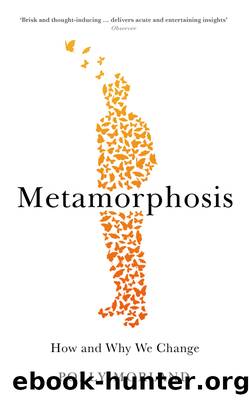Metamorphosis by Polly Morland

Author:Polly Morland [Morland, Polly]
Language: eng
Format: epub
ISBN: 9781782831372
Published: 0101-01-01T00:00:00+00:00
Way back into antiquity people have been divided as to whether, in an ideal world, it is better to change course or to stick to your guns, whether strength lies in the steadfast oak or the flexible reed, as Aesop framed it.
This was the way the conversation turned late one evening in Athens a couple of centuries after Aesop, sometime in the mid-fourth century BC. Two of Platoâs elder brothers, so the philosopher reports, were at a small after-party following the night-time festival of the goddess Bendis, with its thrilling torch relay on horseback and other diversions. Platoâs brothers were serious-minded fellows â you get these people at parties â and as others lounged and discussed the festivities, they found themselves shooting the breeze with their tutor, Socrates. A disquisition followed on the nature of justice, beauty, education, evil, what the Gods think about and â to our theme â whether they change. In truth it was a somewhat one-sided discussion, which also happens at parties, with Socrates holding forth, his two students merely punctuating with a helpful âof courseâ, a âvery trueâ or an âundoubtedlyâ here or there. According to Socratesâ way of thinking, which differs from Aesop, âthings which are at their best are also least liable to be alteredâ. The principle applies, said he, to furniture, houses and clothes, but also to the âbravest and wisest soulsâ which are âleast confused or deranged by any external influenceâ.
Yet away from Mount Olympus and far from Platonic ideals, the very reverse frequently turns out to be true. Indeed alteration of the soul in the welter of a mortal life is often the very fruit of courage and of growing wisdom, as the tale of Didier Long quietly shows. With a lovely echo of Platoâs revisionist student Aristotle, the American psychologist and pioneer of humanistic psychotherapy Carl Rogers put it like this in his 1961 book about change, Becoming a Person: âThis process of the good life is not, I am convinced, a life for the faint-hearted. It involves the stretching and growing of becoming more and more of oneâs potentialities. It involves the courage to be. It means launching oneself fully into the stream of life.â
Download
This site does not store any files on its server. We only index and link to content provided by other sites. Please contact the content providers to delete copyright contents if any and email us, we'll remove relevant links or contents immediately.
| Diaries & Journals | Essays |
| Letters | Speeches |
The Rules Do Not Apply by Ariel Levy(4951)
Bluets by Maggie Nelson(4542)
Too Much and Not the Mood by Durga Chew-Bose(4333)
Pre-Suasion: A Revolutionary Way to Influence and Persuade by Robert Cialdini(4214)
The Motorcycle Diaries by Ernesto Che Guevara(4081)
Walking by Henry David Thoreau(3949)
Schaum's Quick Guide to Writing Great Short Stories by Margaret Lucke(3368)
What If This Were Enough? by Heather Havrilesky(3302)
The Daily Stoic by Holiday Ryan & Hanselman Stephen(3297)
The Day I Stopped Drinking Milk by Sudha Murty(3186)
The Social Psychology of Inequality by Unknown(3013)
Why I Write by George Orwell(2944)
Letters From a Stoic by Seneca(2789)
A Short History of Nearly Everything by Bryson Bill(2681)
A Burst of Light by Audre Lorde(2588)
Insomniac City by Bill Hayes(2537)
Feel Free by Zadie Smith(2473)
Upstream by Mary Oliver(2384)
Miami by Joan Didion(2364)
